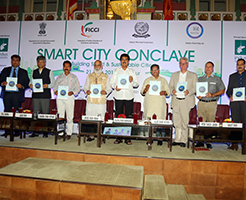BLOG
Udaipur as Smart Heritage City: With its unique geo-heritage and natural assets

Release of the theme paper on the Smart City Conclave: Shriji Arvind Singh Mewar, Chairman and Managing Trustee of the Maharana of Mewar Charitable Foundation, and the dignitaries at the inaugural session of the Smart City Conclave organized by FICCI, Department of Local Self Government, Government of Rajasthan and Udaipur Municipal Corporation, on May 21, 2016 at Sabhagaar The Durbar Hall, Fateh Prakash Palace, Udaipur. On the dais (from left): Mr Atul Sharma of FICCI Rajasthan chapter; Prof Jagan Shah, Director, National Institute of Urban Affairs; Mr Chandra Singh Kothari, Hon’ble Mayor Udaipur Municipal Corporation;Mr Rajpal Singh Shekhawat, Hon’ble Minister for Urban Development and Housing & Local Self Government, Government of Rajasthan;Mr Gulab Chand Kataria, Hon’ble Minister for Home, Government of Rajasthan; the Guest of Honour H E Mr Peter Taksøe-Jensen, Ambassador of The Royal Danish Embassy, New Delhi;Dr Manjit Singh, Principal Secretary – Local Self Government, Government of Rajasthan; and Mr Sandeep Sinha of Indus Towers.
During the inaugural session of the Smart City Conclave, in my address, I drew the attention of the august audience to Udaipur’s unique geo-heritage. My objective was to give the Big Picture for Udaipur as a Smart Heritage City in the 21st century.
Excerpts from the address: “Fact 1: Understand the geography and geo-heritage of the Udaipur region as Smart City plans are drawn up. The city’s geographical advantage is unique. The Aravalli range, its hills and mountains rich with minerals, the forest resources are natural assets that go back to over 4000 years. It is our geo-heritage, unique and incomparable. The Smart City needs to save and sustain these natural assets. This geo-heritage is the cradle for our cultural heritage. At the same time we do NOT have to re-invent the wheel for nurturing and sustaining this geo-heritage.”
“After this session, I would like to present our distinguished guests with published scientific research and writings on this subject. And introduce senior scientists and researchers of Rajasthan like Prof Pushpinder Singh Ranawat and Dr Narpat Singh Rathore whose work on Udaipur’s geo-heritage goes a long way in strengthening Udaipur’s unique identity and heritage. They have developed the art of reinterpreting this recorded history in today’s scientific paradigms.”
“At this moment, suffice it to say that a Natural History Museum in Udaipur’s GulabBaag, a heritage walk in Ahar locality, Zawar Geo-heritage Site are projects waiting to be developed and enhancing the cultural identity of Udaipur as a Smart Heritage City.”
“Fact 2: Udaipur is a 450 year old man-made city. Its lake-system was developed and sustained by my forefathers who built the City Palace and the city along the Lake Pichola. For over 200 years it has been compared to cities like Venice in Europe.
At The City Palace, we have done our bit for water resource management. We set up a waste water management system in place since 1999-2000. It has now been upgraded to 500 KLD in 2015-16, with the consent of the Rajasthan Pollution Control Board. Recycled water is used to irrigate the plantations covering 1 lakh sq. feet area within the City Palace.
The Smart City project presents a marvellous opportunity for all stakeholders to work together, utilise the finest of technologies to preserve, develop and sustain our water resources.
Once again I would add, we do not have to reinvent the wheel, we have to integrate our historical expertise and experiences to create platforms for future growth.”
“Fact 3: Udaipur has emerged as a ‘city of excellence’ not just in tourism but also art and culture, education and sports, entertainment and spirituality.
Equal emphasis and focus needs to be given to all these facets in the Smart Heritage City plans. If this unique city gets identified by only one facet, its identity will be diluted. ‘You cannot have fruits without roots’. I recall these words of a management guru. I wish to state: It is the responsibility of today’s planners, law-makers and administrators to nurture the roots.
The three facts I just mentioned are our roots. It is the challenge of our age: while our world is globalizing and getting smaller by the hour, it is our roots which will distinguish us and provide us our road maps for the future. This is, in essence, the big picture for Udaipur the Smart Heritage City.”
The inaugural session was addressed by the following dignitaries, civil servants and academicians: Prof Jagan Shah, Director, National Institute of Urban Affairs; Dr Manjit Singh, Principal Secretary – Local Self Government, Government of Rajasthan; the Guest of Honour H E Mr Peter Taksøe-Jensen, Ambassador of The Royal Danish Embassy, New Delhi; Mr Chandra Singh Kothari, Hon’ble Mayor Udaipur Municipal Corporation; Mr Rajpal Singh Shekhawat, Hon’ble Minister for Urban Development and Housing & Local Self Government, Government of Rajasthan; and Mr Gulab Chand Kataria, Hon’ble Minister for Home, Government of Rajasthan.
- In conversation with Mr Gulab Chand Kataria, Hon’ble Minister for Home, Government of Rajasthan
- Greetings forMr Chandra Singh Kothari, Hon’ble Mayor Udaipur Municipal Corporation


